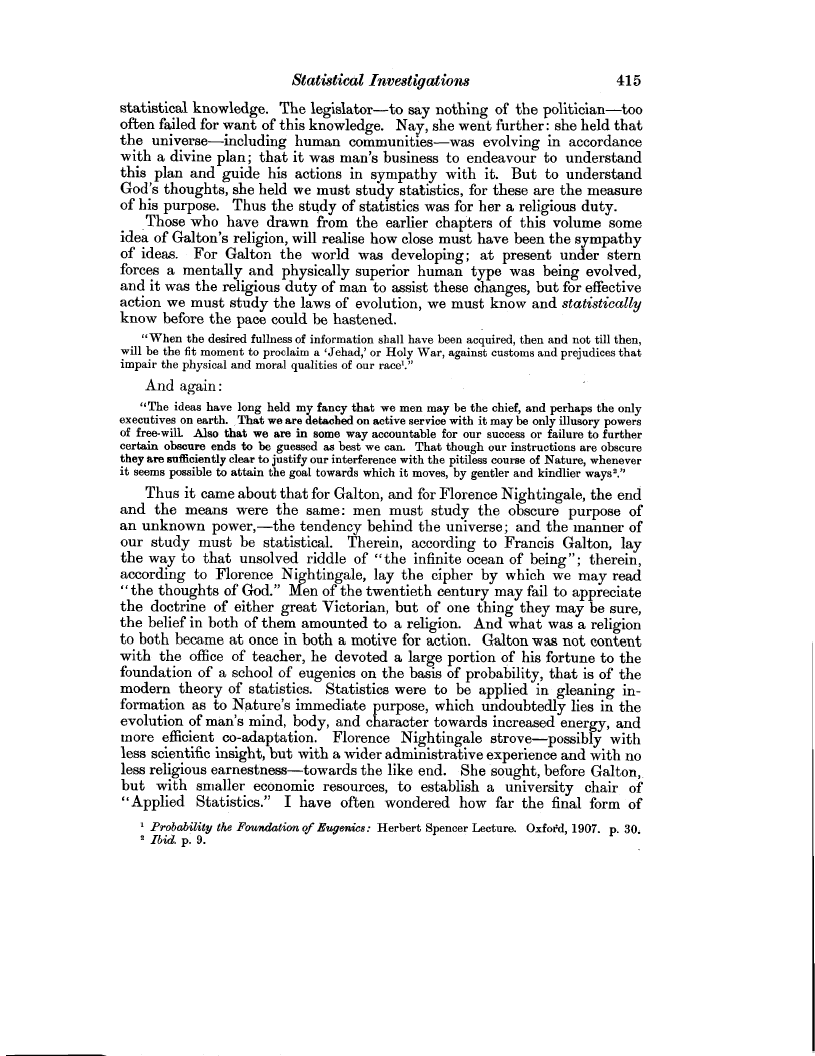Statistical Investigations 415
statistical knowledge. The legislator-to say nothing of the politician-too often failed for want of this knowledge. Nay, she went further: she held that the universe-including human communities-was evolving in accordance with a divine plan; that it was man's business to endeavour to understand this plan and guide his actions in sympathy with it. But to understand God's thoughts, she held we must study statistics, for these are the measure of his purpose. Thus the study of statistics was for her a religious duty.
Those who have drawn from the earlier chapters of this volume some idea of Galton's religion, will realise how close must have been the sympathy of ideas. For Galton the world was developing; at present under stern forces a mentally and physically superior human type was being evolved, and it was the religious duty of man to assist these changes, but for effective action we must study the laws of evolution, we must know and statistically know before the pace could be hastened.
"When the desired fullness of information shall have been acquired, then and not till then, will be the fit moment to proclaim a 'Jehad,' or Holy War, against customs and prejudices that impair the physical and moral qualities of our race'."
And again
"The ideas have long held my fancy that we men may be the chief, and perhaps the only executives on earth. , That we are detached on active service with it may be only illusory powers of free-will. Also that we are in some way accountable for our success or failure to further
certain obscure ends to be guessed as best we can. That though our instructions are obscure they are sufficiently clear to justify our interference with the pitiless course of Nature, whenever it seems possible to attain the goal towards which it moves, by gentler and kindlier ways'."
Thus it came about that for Galton, and for Florence Nightingale, the end and the means were the same: men must study the obscure purpose of an unknown power,-the tendency behind the universe; and the manner of our study must be statistical. Therein, according to Francis Galton, lay the way to that unsolved riddle of "the infinite ocean of being"; therein, according to Florence Nightingale, lay the cipher by which we may read " the thoughts of God." Men of the twentieth century may fail to appreciate the doctrine of either great Victorian, but of one thing they may be sure, the belief in both of them amounted to a religion. And what was a religion to both became at once in both a motive for action. Galton was not content with the office of teacher, he devoted a large portion of his fortune to the foundation of a school of eugenics on the basis of probability, that is of the modern theory of statistics. Statistics were to be applied in gleaning information as to Nature's immediate purpose, which undoubtedly lies in the evolution of man's mind, body, and character towards increased energy, and more efficient co-adaptation. Florence Nightingale strove-possibly with less scientific insight, but with a wider administrative experience and with no less religious earnestness-towards the like end. She sought, before Galton,. but with smaller economic resources, to establish a university chair of "Applied Statistics." I have often wondered how far the final form of
' Probability the Foundation of Eugenics: Herbert Spencer Lecture. Oxford, 1907. p. 30. 2 Ibid. p. 9.

